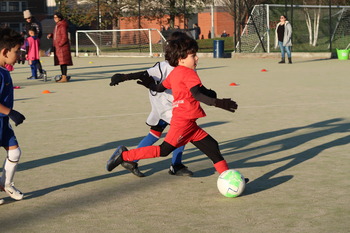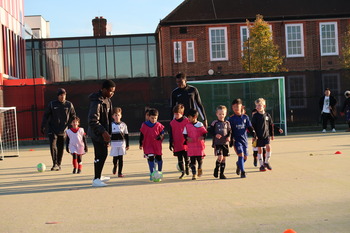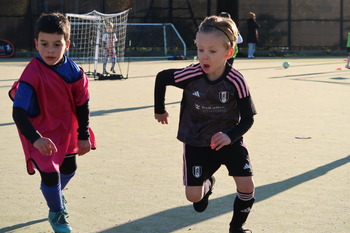The world seems to become a more polarised place with each passing day. How often do you read a newspaper story or stumble across something online reporting another example of hate towards an individual or group because of their beliefs, race or gender?
Football has done much to combat such issues over the past 30 years, led by organisations such as Kick It Out and actions carried out by players themselves. And while the sport still has a long way to go, it has changed radically since the 1980s.
In 2020, the FA, clubs and brilliant coaches who deliver sessions at every level have been trained to uphold the best standards of inclusivity to ensure that players have fun, feel welcome and that the sport is accessible.
Here’s why inclusivity is important in football and some of the great lessons it can teach players of all ages:
Football transcends boundaries
One of the best aspects of the game is the way that it transcends boundaries. Watch any Premier League game and you will see two teams that are a melting pot of ethnicities, nationalities, backgrounds and religions. It doesn’t matter where you’ve come from in life, if you’re able to kick a ball and then you are going to be accepted.
There are still incidents of racism, homophobia or sexism in the game however these incidents are highlighted, punished and shamed by organisations, companies, participants, activists and the media.
We’re seeing that across all walks of football. Previously, there was little to no interest in girl’s football – in fact, people would make it difficult for girls to participate or shame the women’s game. Now, it’s one of the biggest growing sports in England, with the best players in the WSL (Women’s Super League) and the England Lionesses role models carrying out positive actions promoting girls participation.
The level of female participation is still lower than male participation, but the fact that England’s women were front page news during their run to the semi finals of the World Cup last summer is indicative of how football is transcending gender and becoming more and more of an inclusive sport.
The development of the Women’s game and hundreds of initiatives to increase participation of girls at a young age shows how change can be implemented in the sport and how leading organisations are always working to promote inclusivity.
An Inclusive environment teaches respect
Football brings together individuals whose paths may never have otherwise met, at a grassroots level - generally, players will come from the same surrounding areas, but without joining their club, they probably would not meet. That makes it a powerful tool to help people learn about other cultures, backgrounds and ideas, as well as teaching the values of respecting those who may be different to you.
Ultimately, this respect can end up blossoming into unexpected lifelong friendships. The sport promotes social-cohesiveness as communities come together.
Football training offers a release from day-to-day problems
It’s a sad fact of life that bullying exists up and down the country. Yet when children play football, they free themselves from all that. All the while they are on the football pitch attempting to become the next Raheem Sterling or Lucy Bronze, then they forget their worries by just enjoying the game.
Football coaching academies like We Make Footballers Surbiton offer a welcome haven for young people from all walks of life and backgrounds . By being an inclusive sport, football is able to help individuals through tough periods, no matter what their background. It can also serve as a way to help them feel included and forge their identity whilst growing up.
With a strong focus on accessibility, inclusivity and brilliant coaches who deliver sessions in a fun, safe and welcoming environment - WMF Surbiton ensure that all players can take part and enjoy our sport.
Inclusive sport can help give them a welcome increase confidence. Playing as part of a team and making a difference to the success of the collective will make a young person feel valued, boosting their self-esteem and being part of a group.



